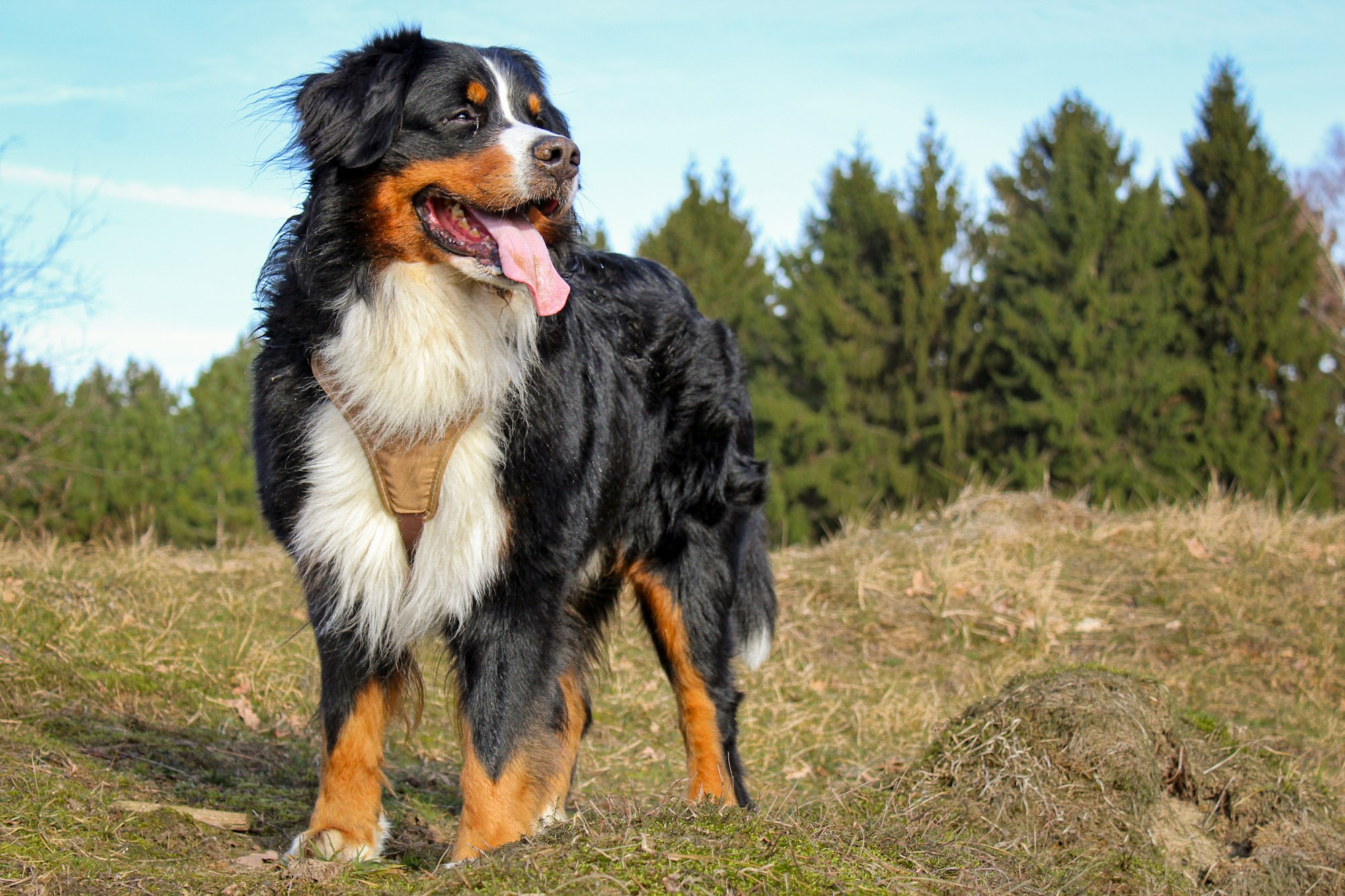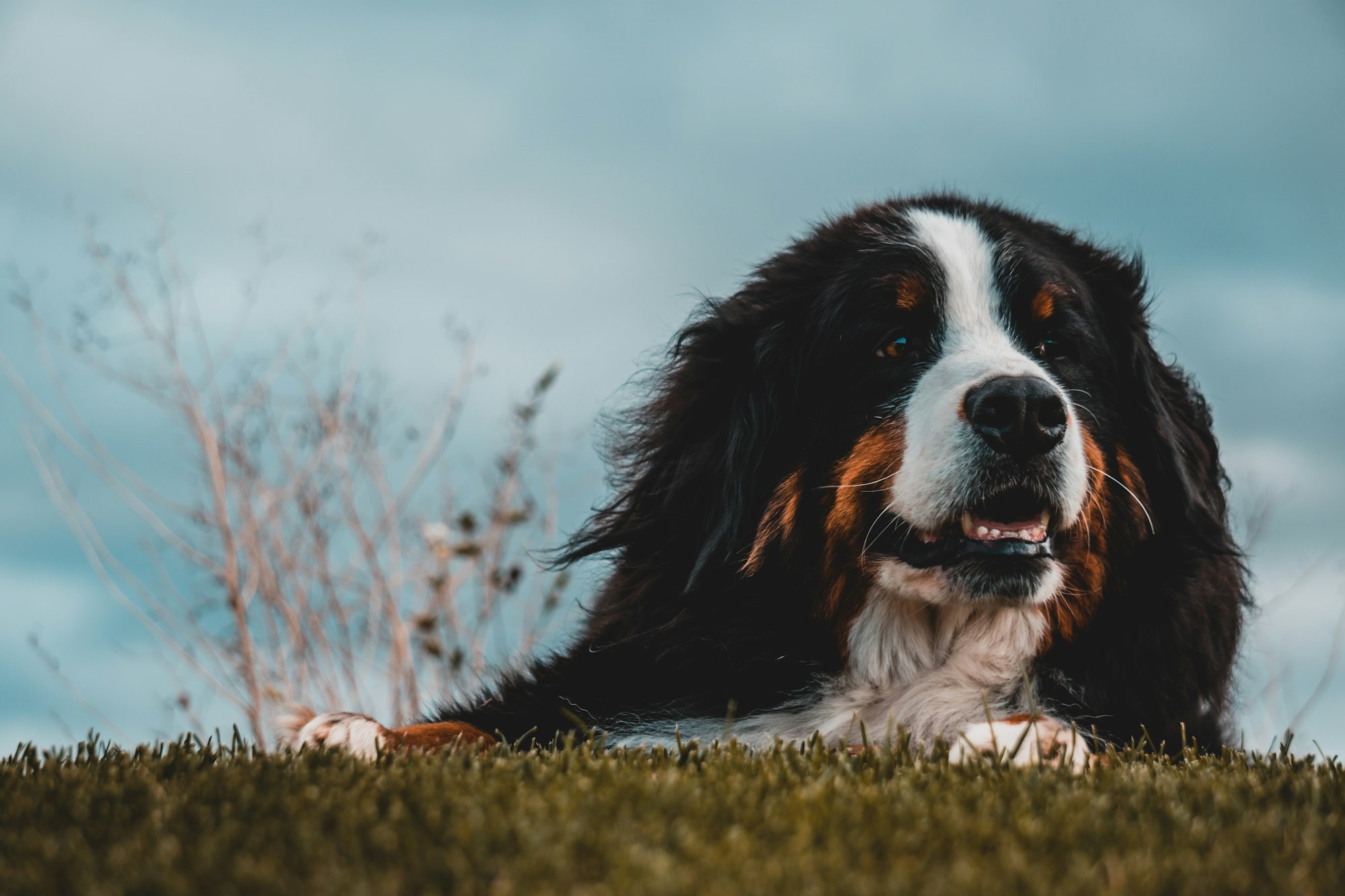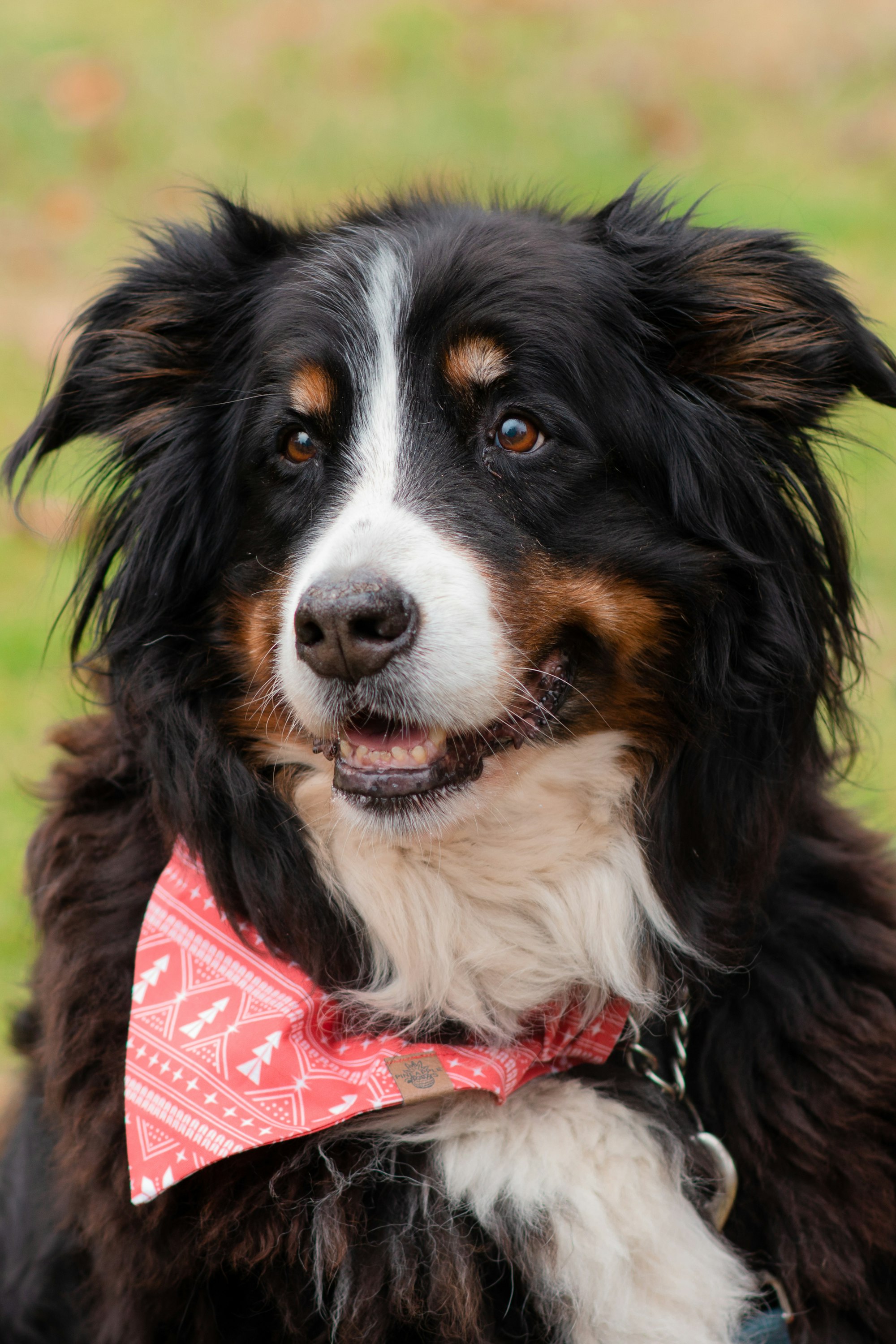When searching for a new furry companion, it's important to consider factors like allergies, especially if you or someone in your household is sensitive to allergens. One term commonly associated with dog breeds is "hypoallergenic." But what does this actually mean?
Let's dive into the topic and explore whether Bernese Mountain Dogs are hypoallergenic as outlined in this article. Hypoallergenic refers to a characteristic in certain breeds of dogs that are less likely to cause an allergic reaction in people who are prone to allergies. However, when it comes to Bernese Mountain Dogs, they are not considered hypoallergenic.

Understanding dog allergies is crucial in determining the compatibility between allergies and dog breeds. Common allergens in dogs include the proteins found in their skin dander, saliva, and urine. Factors such as coat type and dander production play a role in allergies.
Despite their beautiful and thick coats, Bernese Mountain Dogs shed and produce dander, which can trigger allergic reactions. It's essential to consider allergy testing and sensitivity levels before deciding on a particular dog breed.
If you still want to have a Bernese Mountain Dog despite allergies, there are tips to help make living with them more comfortable. Regular grooming and brushing can minimize shedding and dander in the environment. reducing indoor allergens and creating specific allergy-free zones within the home can make a significant difference.
Key takeaway:
- Bernese Mountain Dogs are not hypoallergenic: Despite their many positive qualities, Bernese Mountain Dogs are not hypoallergenic, meaning they can still trigger allergies in sensitive individuals.
- Allergy triggers in Bernese Mountain Dogs: Factors such as their coat, dander, saliva, and urine are potential allergens that can cause reactions in people with dog allergies.
- Tips for living with Bernese Mountain Dogs and allergies: Regular grooming and brushing, reducing indoor allergens, and creating allergy-free zones can help manage allergies when living with Bernese Mountain Dogs.
Are Bernese Mountain Dogs Hypoallergenic?
Curious about whether Bernese Mountain Dogs are hypoallergenic? Let's dive into the topic by exploring key factors such as dog allergies, coat and dander, saliva and urine, and the importance of allergy testing and sensitivity. Get ready to uncover fascinating insights and discover if these adorable dogs are the right fit for your allergies.
Understanding Dog Allergies
Understanding dog allergies is crucial for individuals who suffer from allergies and are considering getting a dog as a pet. Here are some key points to keep in mind:
- Common Allergens in Dogs: Dogs produce allergens that can trigger allergic reactions in sensitive individuals. These allergens primarily come from their dander, saliva, and urine.
- Factors to Consider for Allergies: The severity of allergic reactions can vary depending on the individual's sensitivity level and the specific dog breed. Some breeds produce fewer allergens and are considered hypoallergenic.
- Coat and Dander: Dogs with luscious coats tend to shed more dander, which contains allergens. Low shedding dogs, such as Chinese Cresteds, are better suited for individuals with allergies.
- Saliva and Urine: Dog saliva and urine can also contain allergens. It's important to consider these factors when choosing a dog breed if you have allergies.
- Allergy Testing and Sensitivity: Before bringing a dog into your home, consider getting allergy testing done to determine your specific sensitivities. This will help you choose a dog breed that is less likely to trigger allergic reactions.

If you are an allergy sufferer and want to have a furry companion, it is recommended to research and consult with a specialty club or veterinarian to find a breed with low shedding qualities and lower allergenic potential. Understanding your allergies and choosing a dog breed that suits your specific needs can significantly reduce the chances of allergic reactions and enhance the well-being of both you and your future pet.
Common Allergens in Dogs
- Dog dander is one of the most common allergens in dogs. It consists of tiny flecks of dead skin cells that dogs shed regularly.
- Dogs can carry pollen in their fur when they go outside. This pollen can then trigger allergies in sensitive individuals.
- Just like in human homes, dust mites can be found in dog beds, carpets, and upholstery. Their droppings can cause allergic reactions.
- Dogs can bring mold spores into the house on their fur or paws. These spores can then cause allergic reactions when inhaled.
- Certain insects, such as fleas and ticks, can also cause allergies in dogs. Their saliva and waste products can trigger allergic reactions.
- Dogs can develop allergies to grass and weed pollen. Playing in grassy areas can expose them to these allergens.
- Some dogs can have allergic reactions to certain cleaning products used in the house. These products can leave residues that can irritate their skin or respiratory system.
- Certain ingredients in dog food, such as grains or certain proteins, can cause allergic reactions in dogs. This can manifest as skin issues or digestive problems.
Factors to Consider for Allergies
- Take into account the level of allergens that a specific dog breed produces. Some breeds, like Bernese Mountain Dogs, have luscious coats that shed quite a bit, increasing the chances of allergen exposure.
- Consider the shedding levels of different dog breeds. Breeds that shed less are generally better for allergy sufferers as they release fewer allergens into the environment.
- Evaluate the amount of dander that a particular dog breed produces. Dander is a common allergen found in pet allergies. Breeds that produce less dander are typically more suitable for individuals with allergies.
- Consider your own sensitivity towards dog allergens. Some individuals may have a higher sensitivity to certain allergens, while others may have a lower sensitivity. Understanding your sensitivity can help you choose a dog breed that aligns with your specific needs.
Pro-tip: It's also recommended to spend time with a dog of the breed you are considering before making a decision. This will allow you to see if you have any allergic reactions and determine if you can comfortably coexist with the breed.
What Does Hypoallergenic Mean?
Hypoallergenic means that a product or substance is less likely to cause an allergic reaction in individuals who are sensitive or prone to allergies. When something is hypoallergenic, it has properties that reduce the risk of triggering an allergic response. It is important to note that hypoallergenic does not mean that it is completely allergen-free.
In the case of hypoallergenic dogs, they are breeds that are less likely to cause allergies in people who are allergic to dogs. These breeds produce fewer allergens, such as dander, saliva, or urine, which are known to cause allergic reactions. It is still possible for some individuals to have allergic reactions to hypoallergenic dogs, as allergies can vary from person to person.
To determine if a dog is hypoallergenic, factors such as shedding, the type of coat, and the amount of allergens produced should be considered. Breeds like poodles, bichon frises, and maltese are often considered hypoallergenic because they have hair instead of fur, which reduces the amount of allergens released into the environment.
It is important to remember that while hypoallergenic dogs may be a better choice for people with allergies, it is always advisable to spend time with the specific breed to see if there is any allergic reaction before bringing them into your home.
Tips for Living with Bernese Mountain Dogs and Allergies
Living with Bernese Mountain Dogs and battling allergies can be challenging, but fret not! With some practical tips up my sleeve, you can navigate this hurdle like a pro. From regular grooming and brushing techniques to minimizing indoor allergens, and even creating allergy-free zones, I've got you covered. So, get ready to discover some handy ways to harmoniously coexist with these lovable furry friends, all while keeping those pesky allergies at bay!
Regular Grooming and Brushing
Regular grooming and brushing are vital for maintaining the health and appearance of your Bernese Mountain Dog. Here are some key points to consider:
- Brushing: Make sure to brush your Bernese Mountain Dog's coat on a weekly basis to eliminate loose hair and prevent matting. Use either a slicker brush or a deshedding tool to reach through the thick coat and remove any tangles or debris.
- Bathing: It is important to bathe your dog as necessary, typically every 2-3 months or when they get dirty. Use a mild dog shampoo and gently massage it into their coat, ensuring thorough rinsing to eliminate all soap residue.
- Nail care: Trim your dog's nails regularly to prevent them from becoming too long, which can cause discomfort or difficulty walking. Use a dog nail clipper and be cautious to avoid cutting into the quick, as this can result in bleeding.
- Ears and eyes: Regularly inspect your dog's ears for any signs of redness, irritation, or wax buildup. Clean them gently using a veterinarian-approved ear cleaning solution. Additionally, pay attention to any discharge or redness in their eyes and consult a vet if any issues arise.
- Dental hygiene: Ensure you brush your dog's teeth regularly using a dog toothbrush and toothpaste. This is essential for preventing dental disease and maintaining fresh breath. Introduce toothbrushing gradually and provide rewards to make it a positive experience for your dog.
- Paw care: Check your dog's paws for any cuts, scrapes, or signs of infection. Keep the hair between their paw pads trimmed to prevent the accumulation of mats and debris. Use a dog-friendly moisturizer to keep their paw pads hydrated.
By establishing a consistent grooming routine, you can guarantee that your Bernese Mountain Dog's coat remains healthy and beautiful while also monitoring their overall health and well-being.

Reducing Indoor Allergens
When living with Bernese Mountain Dogs, there are several natural and effective methods for reducing indoor allergens:
- Regularly vacuum and dust surfaces to remove pet dander and other allergens.
- Invest in a high-quality air purifier with a HEPA filter to capture pet allergens in the air.
- Frequently wash your dog's bedding to minimize the buildup of allergens.
- To reduce allergen exposure, consider using hypoallergenic bedding materials for your dog.
- Prevent allergens from settling in by using allergen-resistant covers on furniture and mattresses.
- Keep the living areas well-ventilated by opening windows or using fans to circulate fresh air.
- Reduce allergen levels on your dog's coat by regularly bathing them with hypoallergenic shampoos.
- Create allergen-free zones by limiting your dog's access to certain areas of the house, especially bedrooms.
- Consider installing a central vacuum system to more effectively remove allergens from the home.
Minimizing allergen exposure and living comfortably with a Bernese Mountain Dog can be challenging for many allergy sufferers. However, by implementing these strategies, it is possible to create a healthier and more allergen-friendly environment for both you and your pet.
Other Hypoallergenic Dog Breeds
Looking beyond the Bernese Mountain Dog, let's explore other hypoallergenic dog breeds that can be perfect companions for those with allergies. From similar breeds to Bernese Mountain Dogs to dog breeds specifically recommended for allergies, we'll uncover a range of options to consider. Say goodbye to sneezing and embrace a furry friend with these hypoallergenic breeds.
Similar Breeds to Bernese Mountain Dogs
- Greater Swiss Mountain Dog: Similar in size and appearance to Bernese Mountain Dogs, the Greater Swiss Mountain Dog is known for its strength and agility. This breed has a dense double coat that sheds moderately, making it a good option for allergy sufferers.
- Entlebucher Mountain Dog: Another member of the Swiss Mountain Dog family, the Entlebucher shares similarities with Bernese Mountain Dogs. It has a short and smooth coat that requires minimal grooming. This breed is lively and intelligent, making it a great companion for active families.
- Appenzeller Sennenhund: Also hailing from Switzerland, the Appenzeller Sennenhund is a medium-sized working dog that is comparable to Bernese Mountain Dogs. It has a thick and dense coat that sheds moderately. This breed is highly trainable and loves to have a job to do.
- Alaskan Malamute: Although larger in size than Bernese Mountain Dogs, Alaskan Malamutes share similar features with their fluffy coats and striking markings. They have a thick double coat that needs regular grooming, but they are low shedding. Alaskan Malamutes are considered a breed similar to Bernese Mountain Dogs.
The history of Bernese Mountain Dogs dates back to the Swiss Alps, where they were originally bred as working dogs on farms. They were used for herding cattle, pulling carts, and guarding homes. Known for their gentle and affectionate nature, Bernese Mountain Dogs quickly became beloved family pets. Today, they are still cherished for their loyalty and are often seen participating in activities such as obedience training and therapy work. Despite not being considered hypoallergenic, they continue to be a popular choice for dog lovers around the world.
Dog Breeds Recommended for Allergies
When it comes to finding dog breeds recommended for allergies, it's important to consider their shedding levels, dander production, and sensitivity levels. Here are some dog breeds recommended for allergies:
- Chinese Crested: These small dogs have minimal hair and are known for being hypoallergenic due to their low shedding qualities.
- Poodles: Poodles come in different sizes and have a curly coat, which helps to minimize shedding and dander.
- Maltese: These small dogs have a silky coat that doesn't shed much, making them a good choice for people with allergies.
- Bichon Frise: Known for their fluffy white coats, Bichon Frises produce less dander and are considered hypoallergenic.
- Portuguese Water Dog: These dogs have a thick, curly coat that doesn't shed much, making them a good choice for allergy sufferers.
Some Facts About Bernese Mountain Dog Hypoallergenic:
- ✅ The Bernese Mountain Dog is not hypoallergenic. (Source: Our Team)
- ✅ Hypoallergenic dogs have a non-shedding coat and produce less dander. (Source: Our Team)
- ✅ Dander in the skin and fur of Bernese Mountain Dogs can cause allergies. (Source: Our Team)
- ✅ 10-20% of the population is allergic to dogs, and hypoallergenic breeds are sought after for minimizing allergy symptoms. (Source: Our Team)
- ✅ Despite not being hypoallergenic, Bernese Mountain Dogs are known for their loyalty and affection, making them suitable for families and outdoor enthusiasts. (Source: Our Team)
Frequently Asked Questions
Are Bernese Mountain Dogs hypoallergenic?
No, Bernese Mountain Dogs are not hypoallergenic. They have dander in their skin and fur, which can cause allergic reactions such as watery eyes, shallow breathing, and skin irritation.
What does hypoallergenic mean in relation to dogs?
Hypoallergenic means that a dog or product does not contain allergens that may trigger an allergic reaction. However, there is no scientifically agreed meaning for hypoallergenic, and the term is often misused.
Are there hypoallergenic dog breeds?
Yes, there are hypoallergenic dog breeds. These breeds typically have non-shedding coats and produce less dander, making them more suitable for people with allergies. Some examples include Maltese, Poodles, Labradoodles, Basenji, Goldendoodles, Afghan Hounds, and Schnauzers.
Can mixed breed doodles like Goldendoodles and Labradoodles be hypoallergenic?
Whether mixed breed doodles are hypoallergenic depends on the coat type inherited from their Poodle and other breed parent. Some may have minimal shedding and produce less dander, making them hypoallergenic, while others may not.
How can I choose a hypoallergenic dog for severe pet allergies?
For those with severe pet allergies, it is best to choose a breed that is known to be non-shedding or hairless. Some examples of hypoallergenic breeds with no hair at all are the Xoloitzcuintli, American Hairless Terrier, and Chinese Cresteds.
Can I still adopt a Bernese Mountain Dog if I have allergies?
Yes, it is still possible to adopt a Bernese Mountain Dog even if you have allergies. While they are not hypoallergenic, taking measures such as daily brushing and occasional trimming can help reduce the chances of allergic reactions.

